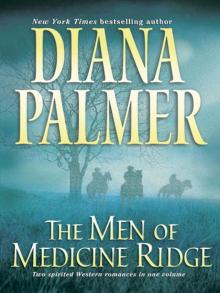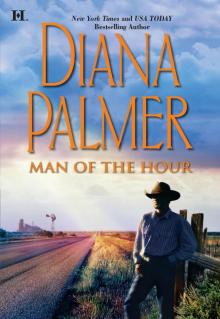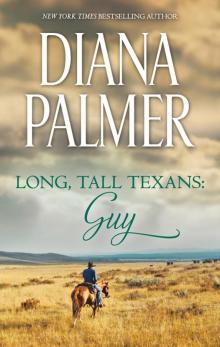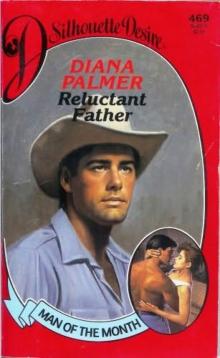- Home
- Diana Palmer
Tough to Tame Page 2
Tough to Tame Read online
Page 2
“Good for Dr. Rydel.” He smiled. “If he’s that nice to animals, he isn’t likely the sort of person who’d hit women,” he had to agree. “I was told by my friend that Rydel was a good sort to work for.” He frowned. “Your boyfriend kicked your cat on your first date.”
She grimaced. “And I made excuses for him.” Not long after that, her cat had vanished. She’d often wondered what had happened to him, but he returned after her boyfriend left. “Frank was so handsome, so…eligible,” she added quietly. “I guess I was flattered that a man like that would look twice at me. I’m no beauty.”
“You are. Inside.”
“You’re a nice brother. How about that soup?”
He sighed. “I’ll eat it if you’ll fix it. I’m sorry. About the way I am.”
“Like you can help it,” she muttered, and smiled. “I’ll get it started.”
He watched her walk away, thoughtful.
She brought in a tray and had her soup with him. There were just the two of them, all alone in the world. Their parents had died long ago, when she was ten. Kell, who’d been amazingly athletic and healthy in those days, had simply taken over and been a substitute parent to her. He’d been in the military, and they’d traveled all over the world. A good deal of her education had been completed through correspondent courses, although she’d seen a lot of the world. Now, Kell thought he was a burden, but what had she been for all those long years when he’d sacrificed his own social life to raise a heartbroken kid? She owed him a lot. She only wished she could do more for him.
She remembered him in his uniform, an officer, so dignified and commanding. Now, he was largely confined to bed or that wheelchair. It wasn’t even a motorized one, because they couldn’t afford it. He did continue to work, in his own fashion, at crafting a novel. It was an adventure, based on some knowledge he’d acquired from his military background and a few friends who worked, he said, in covert ops.
“How’s the book coming?” she asked.
He laughed. “Actually I think it’s going very well. I spoke to a buddy of mine in Washington about some new political strategies and robotic warfare innovations.”
“You know everybody.”
He made a face at her. “I know almost everybody.” He sighed. “I’m afraid the phone bill will be out of sight again this month. Plus I had to order some more books on Africa for the research.”
She gave him a look of pride. “I don’t care. You accomplish so much,” she said softly. “More than a lot of people in much better shape physically.”
“I don’t sleep as much as most people do,” he said wryly. “So I can work longer hours.”
“You need to talk to Dr. Coltrain about something to make you sleep.”
He sighed. “I did. He gave me a prescription.”
“Which you didn’t get filled,” she accused. “Connie, at the pharmacy, told on you.”
“We don’t have the money right now,” he said gently. “I’ll manage.”
“It’s always money,” she said miserably. “I wish I was talented and smart, like you. Maybe I could get a better-paying job.”
“You’re good at what you do,” he replied firmly. “And you love your work. Believe me, that’s a lot more important than making a big paycheck. I should know.”
She sighed as she sipped her soup. “I guess.” She gave him a quick glance. “But it would help with the bills.”
“My book is going to make us millions,” he told her with a grin. “It will hit the top of the New York Times bestseller list, I’ll be in demand for talk shows and we’ll be able to buy a new car.”
“Optimist,” she accused.
“Hey, without hope, what have we got?” He looked around with a grimace. “Unpainted walls, cracks in the paint, a car with two hundred thousand miles on it and a leaky roof.”
“Oh, darn,” she muttered, following his eyes to the yellow spot on the ceiling. “I’ll bet another one of those stupid nails worked its way out of the tin. I wish we could have afforded a shingle roof.”
“Well, tin is cheaper, and it looks nice.”
She looked at him meaningfully.
“It’s cheap, anyway,” he persisted. “Don’t you like the sound of rain on a tin roof? Just listen. It’s like music.”
It was like a tin drum, she pointed out, but he just laughed.
She smiled. “I guess you’re right. It’s better not to wish we had more than we do. We’ll get by, Kell,” she assured him. “We always do.”
“At least we’re in it together,” he agreed. “But you should think about the military home.”
“After I’m dead and buried, you can go into a home,” she assured him. “For now, you just eat your soup and hush.”
He smiled tenderly. “Okay.”
She smiled back. He was the nicest big brother in the whole world, and she wasn’t abandoning him while there was a breath in her body.
It had stopped raining when she got to work the next morning. She was glad. She hadn’t wanted to get out of bed at all. There was something magical about lying in the bed with rain coming down, all safe and cozy and warm. But she wanted to keep her job. She couldn’t do both.
She was putting her raincoat in the closet when a long arm presented itself over her shoulder and deposited a bigger raincoat there.
“Hang that up for me, please,” Dr. Rydel said gruffly.
“Yes, sir.”
She fumbled it onto a hanger. When she closed the door and turned, he was still standing there.
“Is something wrong, sir?” she asked formally.
He was frowning. “No.”
But he looked as if he had the weight of the world on his shoulders. She knew how that felt, because she loved her brother and she couldn’t help him. Her soft gray eyes looked up into his pale blue ones. “When life gives you lemons, make lemonade?” she ventured.
A laugh escaped his tight control. “What the hell would you know about lemons, at your age?” he asked.
“It isn’t the age, Dr. Rydel,” she said. “It’s the mileage. If I were a car, they’d have to decorate me with solid gold accessories just to get me off the lot.”
His eyes softened, just a little. “I suppose I’d be in a junkyard.”
She laughed, quickly controlling it. “Sorry.”
“Why?”
“You’re sort of hard to talk to,” she confessed.
He drew in a long breath. Just for a minute, he looked oddly vulnerable. “I’m not used to people. I deal with them in the practice, but I live alone. I have most of my life.” He frowned. “Your brother lives with you, doesn’t he? Why doesn’t he work?”
She tightened up. “He was overseas covering a war and a bomb exploded nearby. He caught shrapnel in the spine and they can’t operate. He’s paralyzed from the waist down.”
He grimaced. “That’s a hell of a way to end up in a wheelchair.”
“Tell me about it,” she agreed quietly. “He was in the military for years, but he got tired of dragging me all over the world, so he mustered out and got a job working for this magazine. He said it would mean he wouldn’t be gone so much.” She sighed. “I guess he wasn’t, but he’s in a lot of pain and they can’t do much for it.” She looked up at him. “It’s hard to watch.”
For an instant, some fellow feeling flared in his eyes. “Yes. It’s easier to hurt yourself than to watch someone you love battle pain.” His face softened as he looked down at her. “You take care of him.”
She smiled. “Yes. Well, as much as he’ll let me, anyway. He took care of me from the age of ten, when our parents died in a wreck. He wants me to let him go into some sort of military home, but I’ll never do that.”
He looked very thoughtful. And sad. He looked as if he badly needed someone to talk to, but he had nobody. She knew the feeling.
“Life is hard,” she said gently.
“Then you die,” he added, and managed a smile. “Back to work, Miss Drake.” He hesitated. “Your nam
e, Cappie. What’s it short for?”
She hesitated. She bit her lower lip.
“Come on,” he coaxed.
She drew in a breath. “Capella,” she said.
His eyebrows shot up. “The star?”
She laughed, delighted. Most people had no idea what it meant. “Yes.”
“One of your parents was an astronomy buff,” he guessed.
“No. My mother was an astronomer, and my father was an astrophysicist,” she corrected, beaming. “He worked for NASA for a while.”
He pursed his lips. “Brainy people.”
“Don’t worry, it didn’t rub off on me. Kell got all that talent. In fact, he’s writing a book, an adventure novel.” She smiled. “I just know it’s going to be a blockbuster. He’ll rake in the money, and then we won’t have to worry about money for medicine and health care.”
“Health care.” He harrumphed. “It’s a joke. People going without food to buy pills, without clothes to afford gas, having to choose between essentials and no help anywhere to change things.”
She was surprised at his attitude. Most people seemed to think that health care was available to everybody. Actually she could only afford basic coverage for herself. If she ever had a major medical emergency, she’d have to beg for help from the state. She hoped she could even get it. It still amazed her that Kell’s employers hadn’t offered him health care benefits. “We don’t live in a perfect society,” she agreed.
“No. Nowhere near it.”
She wanted to ask him why he was so outspoken on the issue, which hit home for her, too. But before she could overcome her shyness, the phones were suddenly ringing off the hook and three new four-legged patients walked in the door with their owners. One of them, a big Boxer, made a beeline for a small poodle whose owner had let it come in without a lead.
“Grab him!” Cappie called, diving after the Boxer.
Dr. Rydel followed her, gripping the Boxer’s lead firmly. He pulled up on it just enough to establish control, and held it so that the dog’s head was erect. “Down, sir!” he said in a commanding tone. “Sit!”
The Boxer sat down at once. So did all the pet owners. Cappie burst out laughing. Dr. Rydel gave her a speaking glance, turned, and led the Boxer back to the patient rooms without a single word.
CHAPTER TWO
WHEN SHE got home, Cappie told her brother about the struggle with the Boxer, and its result. He roared with laughter. It had been a long time since she’d seen him laugh.
“Well, at least he can control animals and people,” he told her.
“Indeed he can.” She picked up the dirty dishes and stacked them from their light supper. “You know, he’s very adamant about health care. For people, I mean. I wonder if he has somebody who can’t afford medicines or doctors or hospitals? He never talks about his private life.”
“Neither do you,” he pointed out dryly.
She made a face. “I’m not interesting. Nobody would want to know what I do at home. I just cook and clean and wash dishes. What’s exciting about that? When you were in the army, you knew movie stars and sports legends.”
“They’re just like you and me,” he told her. “Fame isn’t a character reference. Neither is wealth.”
“Well, I wouldn’t mind being rich,” she sighed. “We could fix the roof.”
“One day,” he promised her, “we’ll get out of the hole.”
“You think?”
“Miracles happen every day.”
She wasn’t touching that line with a pole. Just lately, she’d have given blood for a miracle that would treat her just to a new raincoat. The one she had, purchased for a dollar at a thrift shop, was worn and faded and missing buttons. She’d sewed others on, but none of them matched. It would be so nice to have one that came from a store, brand-new, with that smell that clothes had when nobody had ever worn them before.
“What are you thinking about?” Kell asked.
“New raincoats,” she sighed. Then she saw his expression and grimaced. “Sorry. Just a stray thought. Don’t mind me.”
“Santa Claus might bring you one,” he said.
She glowered at him on her way out the door. “Listen, Santa Claus couldn’t find this place if he had GPS on his sleigh. And if he did, his reindeer would slide off the tin roof and fall to their doom, and we’d get sued.”
He was still laughing when she got to the kitchen.
It was getting close to Christmas. Cappie dug out the old, faded artificial Christmas tree and put it up in the living room where Kell could see it from his hospital bed. She had one new string of minilights, all she could afford, and she put the old ornaments on it. Finally she plugged in the tree. It became a work of art, a magical thing, when she turned out the other lights and looked at it.
“Wow,” Kell said in a soft tone.
She moved to the doorway and smiled at him. “Yeah. Wow.” She sighed. “Well, at least it’s a tree. I wish we could have a real one.”
“Me, too, but you spent every Christmas sick in bed until we realized you were allergic to fir trees.”
“Bummer.”
He burst out laughing. “Now, all we have to do is decide what we’re going to put under it.”
“Artificial presents, I guess,” she said quietly.
“Stop that. We’re not destitute.”
“Yet.”
“What am I going to do with you? There is a Santa Claus, ‘Virginia,’” he chided. “You just don’t know it yet.”
She turned the lights back on and smiled at him. “Okay. Have it your way.”
“And we’ll put presents under it.”
Only if they come prepaid and already wrapped, she thought cynically, but she didn’t say it. Life was hard, when you lived on the fringes of society. Kell had a much better attitude than she did. Her optimism was losing ground by the day.
The beginning of the week started out badly. Dr. Rydel and Dr. King had a very loud and disturbing argument over possible treatments for a beautiful black Persian male cat with advanced kidney failure.
“We can do dialysis,” Dr. King argued.
Dr. Rydel’s pale blue eyes threw off sparks. “Do you intend to contribute to the ‘let’s prolong Harry’s suffering’ fund?”
“Excuse me?”
“His owner is retired. All she has is her social security, because her pension plan crashed and burned during the economic downturn,” he said hotly. “How the hell do you think she’s going to afford dialysis for a cat who’s got, at the most, a couple of weeks of acute suffering to go before he faces an end to the pain?”
Dr. King was giving him very odd looks. She didn’t say anything.
“I can irrigate him and pump drugs into him and keep him alive for another month,” he said through his teeth. “And he’ll be in agony all that time. I can do dialysis and prolong it even more. Or do you think that animals don’t really feel pain at all?”
She still hadn’t spoken. She just looked at him.
“Dialysis!” he scoffed. “I love animals, too, Dr. King, and I’d never give up on one that had a ghost of a chance of a normal life. But this cat isn’t having a normal life—he’s going through hell on a daily basis. Or haven’t you ever seen a human being in the final stages of kidney failure?” he demanded.
“No, I haven’t,” Dr. King said, in an unusually gentle tone.
“You can take it from me that it’s the closest thing to hell on earth. And I am not, repeat not, putting the cat on dialysis and that’s the advice I’m giving his owner.”
“Okay.”
He frowned. “Okay?”
She didn’t smile. “It must have been very hard to watch,” she added quietly.
His face, for an instant, betrayed the anguish of a personal loss of some magnitude. He turned away and went back into his office. He didn’t even slam the door.
Cappie and Keely flanked Dr. King, all big eyes and unspoken questions.
“You don’t know, do you?” she as
ked. She motioned them off into the chart room and closed the door. “You didn’t hear me say this,” she instructed, and waited until they both nodded. “His mother was sixty when they diagnosed her with kidney failure three years ago. They put her on dialysis and gave her medications to help put off the inevitable, but she lost the battle just a year later when they discovered an inoperable tumor in her bladder. She was in agony. All that time, she had only her social security and Medicaid to help. Her husband, Dr. Rydel’s stepfather, wouldn’t let him help at all. In fact, Dr. Rydel had to fight just to see his mother. He and his stepfather have been enemies for years, and it just got worse when his mother was so ill. His mother died and he blames his stepfather, first for not letting her go to a doctor for tests in the first place, and then for not letting him help with the costs afterward. She lived in terrible poverty. Her husband was too proud to accept a dime from any other source, and he worked as a night watchman in a manufacturing company.”
No wonder Dr. Rydel was so adamant about health care, Cappie thought. She saw him through different eyes. She also understood his frustration.
“He’s right, too, about Harry’s owner,” Dr. King added. “Mrs. Trammel doesn’t have much left after she pays her own medicine bills and utilities and groceries. Certainly she doesn’t have enough to afford expensive treatments for an elderly cat who doesn’t have long to live no matter what we do.” She grimaced. “It’s wonderful that we have all these new treatments for our pets. But it’s not good that we sometimes make decisions that aren’t realistic. The cat is elderly and in constant pain. Are we doing it a favor to order thousands of dollars of treatments that its owner can’t afford, just to prolong the suffering?”
Keely shrugged. “Bailey, Boone’s German shepherd, would have died if Dr. Rydel hadn’t operated on him when he got bloat,” she ventured.

 A Cattleman's Honor
A Cattleman's Honor For Now and Forever
For Now and Forever Texas Proud and Circle of Gold
Texas Proud and Circle of Gold Marrying My Cowboy
Marrying My Cowboy Wyoming Heart
Wyoming Heart Christmas Kisses with My Cowboy
Christmas Kisses with My Cowboy Wyoming True
Wyoming True The Rancher's Wedding
The Rancher's Wedding Mercenary's Woman ; Outlawed!
Mercenary's Woman ; Outlawed! Long, Tall Texans: Stanton ; Long, Tall Texans: Garon
Long, Tall Texans: Stanton ; Long, Tall Texans: Garon Lawless
Lawless Blake
Blake Escapade
Escapade Fire Brand
Fire Brand Cattleman's Choice
Cattleman's Choice Mountain Man
Mountain Man Long, Tall and Tempted
Long, Tall and Tempted A Love Like This
A Love Like This Miss Greenhorn
Miss Greenhorn Magnolia
Magnolia Lord of the Desert
Lord of the Desert Wyoming Fierce
Wyoming Fierce True Colors
True Colors Calamity Mom
Calamity Mom The Pursuit
The Pursuit Rogue Stallion
Rogue Stallion Date with a Cowboy
Date with a Cowboy Heart of Winter
Heart of Winter Friends and Lovers
Friends and Lovers Love on Trial
Love on Trial Boss Man
Boss Man Callaghan's Bride
Callaghan's Bride Before Sunrise
Before Sunrise The Men of Medicine Ridge
The Men of Medicine Ridge Texas Proud
Texas Proud Wyoming Tough
Wyoming Tough Passion Flower
Passion Flower Maggie's Dad
Maggie's Dad Donavan
Donavan The Rancher & Heart of Stone
The Rancher & Heart of Stone Long, Tall Texans: Tom
Long, Tall Texans: Tom The Case of the Mesmerizing Boss
The Case of the Mesmerizing Boss Montana Mavericks Weddings
Montana Mavericks Weddings Redbird
Redbird Wyoming Strong
Wyoming Strong Darling Enemy
Darling Enemy Love by Proxy
Love by Proxy Coltrain's Proposal
Coltrain's Proposal The Best Is Yet to Come & Maternity Bride
The Best Is Yet to Come & Maternity Bride Rawhide and Lace
Rawhide and Lace Wyoming Rugged
Wyoming Rugged Patient Nurse
Patient Nurse Undaunted
Undaunted Long Tall Texans Series Book 13 - Redbird
Long Tall Texans Series Book 13 - Redbird Outsider
Outsider Long, Tall Texans: Drew
Long, Tall Texans: Drew Long, Tall Texans--Christopher
Long, Tall Texans--Christopher Merciless
Merciless A Match Made Under the Mistletoe
A Match Made Under the Mistletoe Evan
Evan Hunter
Hunter Now and Forever
Now and Forever Hard to Handle
Hard to Handle Amelia
Amelia Man of the Hour
Man of the Hour Invincible
Invincible The Maverick
The Maverick Long, Tall Texans--Guy
Long, Tall Texans--Guy Noelle
Noelle Enamored
Enamored The Best Is Yet to Come
The Best Is Yet to Come The Humbug Man
The Humbug Man Wyoming Brave
Wyoming Brave Calhoun
Calhoun Long, Tall Texans--Harden
Long, Tall Texans--Harden The Reluctant Father
The Reluctant Father Lawman
Lawman Long, Tall Texans: Hank & Ultimate Cowboy ; Long, Tall Texans: Hank
Long, Tall Texans: Hank & Ultimate Cowboy ; Long, Tall Texans: Hank Grant
Grant Nelson's Brand
Nelson's Brand Wyoming Legend
Wyoming Legend Diamond Spur
Diamond Spur That Burke Man
That Burke Man Wyoming Bold (Mills & Boon M&B)
Wyoming Bold (Mills & Boon M&B) Heartless
Heartless Long, Tall Texans--Luke
Long, Tall Texans--Luke To Have and to Hold
To Have and to Hold Once in Paris
Once in Paris A Husband for Christmas: Snow KissesLionhearted
A Husband for Christmas: Snow KissesLionhearted Night Fever
Night Fever Beloved
Beloved The Australian
The Australian Ethan
Ethan Long, Tall Texans: Jobe
Long, Tall Texans: Jobe Bound by Honor: Mercenary's WomanThe Winter Soldier
Bound by Honor: Mercenary's WomanThe Winter Soldier Tender Stranger
Tender Stranger After Midnight
After Midnight September Morning
September Morning To Wear His Ring
To Wear His Ring Heartbreaker
Heartbreaker Will of Steel
Will of Steel Dangerous
Dangerous Fit for a King
Fit for a King Diamond in the Rough
Diamond in the Rough Matt Caldwell: Texas Tycoon
Matt Caldwell: Texas Tycoon Iron Cowboy
Iron Cowboy Fire And Ice
Fire And Ice Long, Tall Texans--Quinn--A Single Dad Western Romance
Long, Tall Texans--Quinn--A Single Dad Western Romance Montana Mavericks, Books 1-4
Montana Mavericks, Books 1-4 Denim and Lace
Denim and Lace Eye of the Tiger
Eye of the Tiger The Princess Bride
The Princess Bride Long, Tall Texans: Rey ; Long, Tall Texans: Curtis ; A Man of Means ; Garden Cop
Long, Tall Texans: Rey ; Long, Tall Texans: Curtis ; A Man of Means ; Garden Cop Justin
Justin Nora
Nora The Morcai Battalion
The Morcai Battalion Heart of Stone
Heart of Stone The Morcai Battalion: The Recruit
The Morcai Battalion: The Recruit To Love and Cherish
To Love and Cherish Invictus
Invictus Regan's Pride
Regan's Pride A Man for All Seasons
A Man for All Seasons Sweet Enemy
Sweet Enemy Desperado
Desperado Lacy
Lacy The Winter Man
The Winter Man Diamond Girl
Diamond Girl Man of Ice
Man of Ice Reluctant Father
Reluctant Father Christmas with My Cowboy
Christmas with My Cowboy Love with a Long, Tall Texan
Love with a Long, Tall Texan Wyoming Bold wm-3
Wyoming Bold wm-3 King's Ransom
King's Ransom Christmas Cowboy
Christmas Cowboy Heart of Ice
Heart of Ice Fearless
Fearless Long, Tall Texans_Hank
Long, Tall Texans_Hank Unbridled
Unbridled Champagne Girl
Champagne Girl The Greatest Gift
The Greatest Gift Storm Over the Lake
Storm Over the Lake Sutton's Way
Sutton's Way Lionhearted
Lionhearted Renegade
Renegade Betrayed by Love
Betrayed by Love Dream's End
Dream's End All That Glitters
All That Glitters Hoodwinked
Hoodwinked Soldier of Fortune
Soldier of Fortune Rage of Passion
Rage of Passion Winter Roses
Winter Roses Rough Diamonds: Wyoming ToughDiamond in the Rough
Rough Diamonds: Wyoming ToughDiamond in the Rough Protector
Protector Emmett
Emmett True Blue
True Blue The Tender Stranger
The Tender Stranger Lone Star Winter
Lone Star Winter Man in Control
Man in Control The Rawhide Man
The Rawhide Man Untamed
Untamed Midnight Rider
Midnight Rider Trilby
Trilby A Long Tall Texan Summer
A Long Tall Texan Summer Tangled Destinies
Tangled Destinies LovePlay
LovePlay Blind Promises
Blind Promises Carrera's Bride
Carrera's Bride Calamity Mum
Calamity Mum Long, Tall Texan Legacy
Long, Tall Texan Legacy Bound by Honor
Bound by Honor Wyoming Winter--A Small-Town Christmas Romance
Wyoming Winter--A Small-Town Christmas Romance Mystery Man
Mystery Man Roomful of Roses
Roomful of Roses Defender
Defender Bound by a Promise
Bound by a Promise Paper Rose
Paper Rose If Winter Comes
If Winter Comes Circle of Gold
Circle of Gold Cattleman's Pride
Cattleman's Pride The Texas Ranger
The Texas Ranger Lady Love
Lady Love Unlikely Lover
Unlikely Lover A Man of Means
A Man of Means The Snow Man
The Snow Man The Case of the Missing Secretary
The Case of the Missing Secretary Harden
Harden Tough to Tame
Tough to Tame The Savage Heart
The Savage Heart